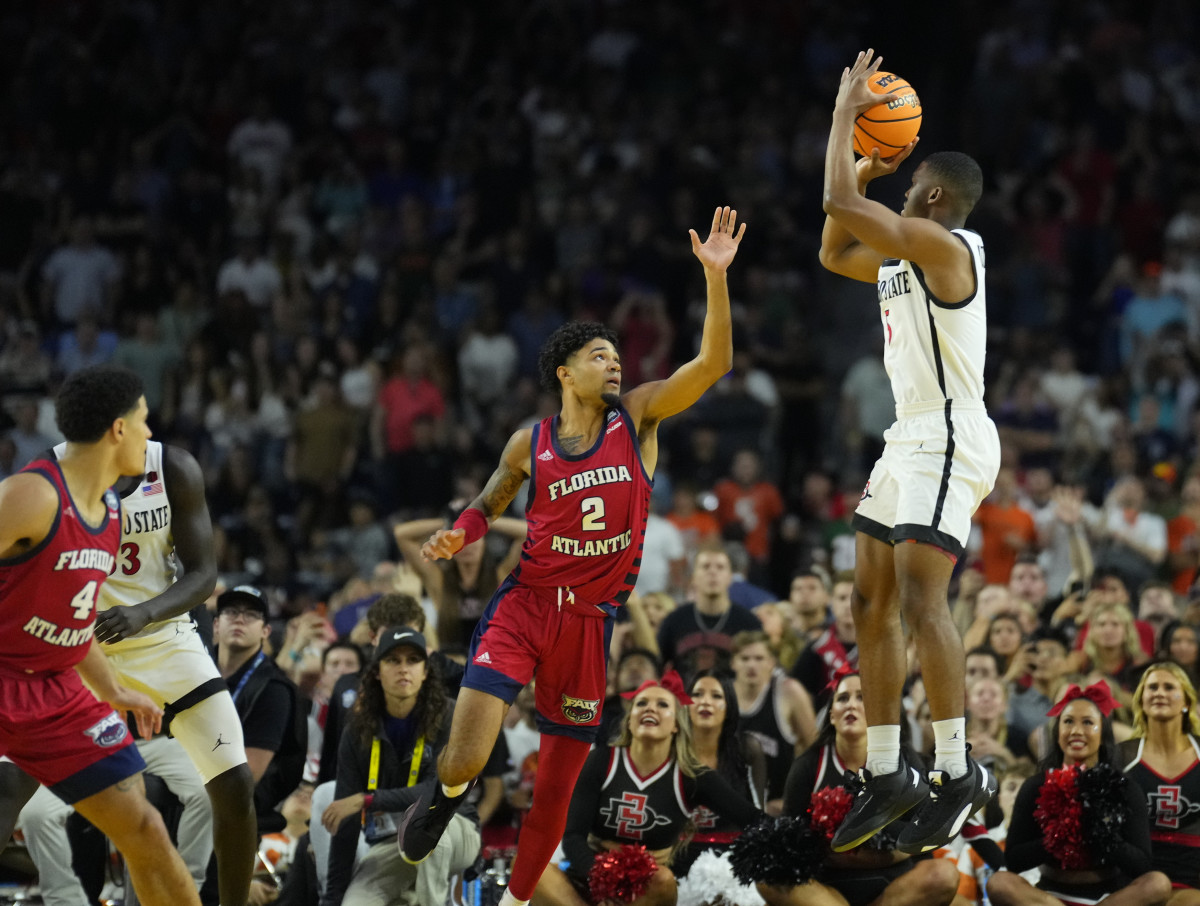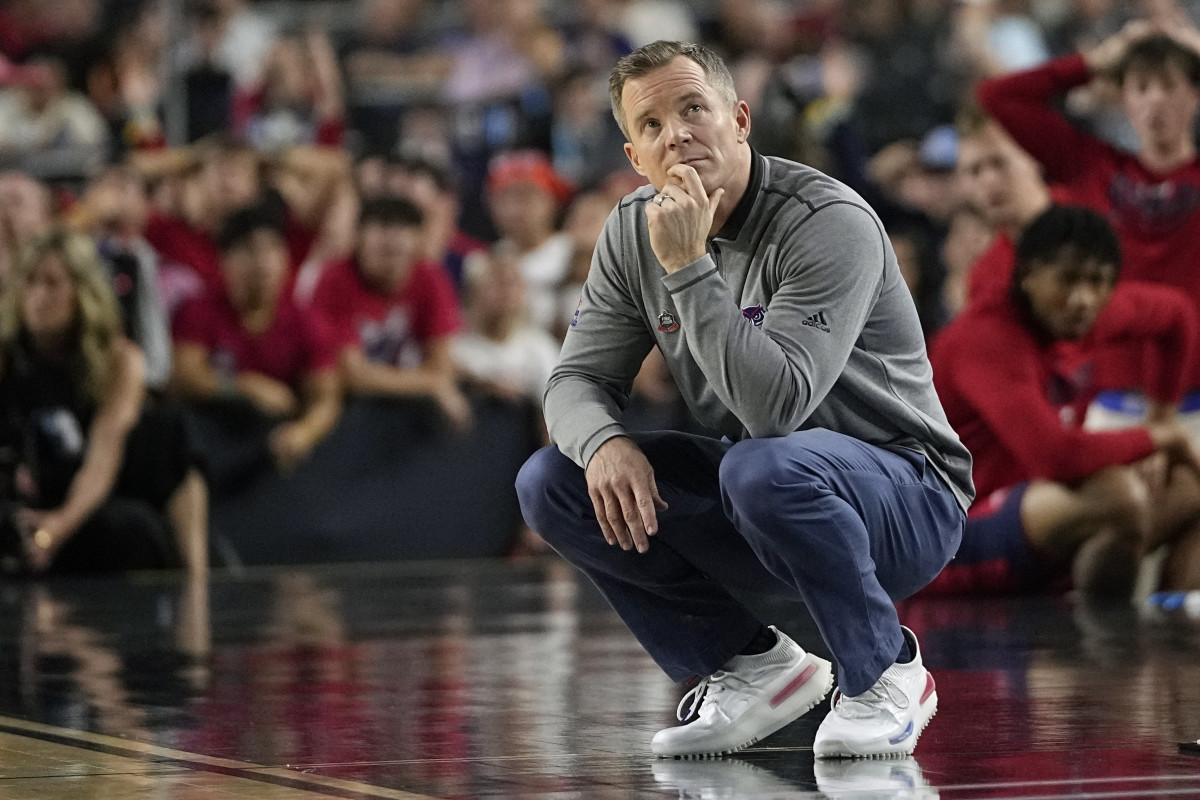A Buzzer-Beater For Teammates, Family and a Fallen Sister

HOUSTON—Asasha Lache Hall wasn’t in the stands at NRG Stadium to see her little brother become an instant NCAA tournament hero. But she was present.
Her picture is the screensaver on San Diego State guard Lamont Butler’s phone, and he believes her spirit was with him as he played—just as it’s been with him for the 14 months since his parents delivered him terrible news: Asasha had been murdered in her California home at age 30.
She would have adored this moment. Asasha had a knack for working her way down near courtside at Lamont’s home games, loud and proud of him and the rest of the Aztecs, one of his biggest supporters. “I miss her every day,” Butler says in the postgame locker room. “I wish she was here. But I’m doing this for her and for my family. I’m doing everything I can to make her happy.”
Butler spread delirious joy throughout San Diego State fandom Saturday night by swishing an 18-foot jump shot at the final horn—the first buzzer-beater of this chaotic tournament—to give the Aztecs a 72–71 victory against Florida Atlantic in the Final Four. They never led over the final 28 minutes—until that shot ripped the net.
Now San Diego State will play powerful Connecticut on Monday night, winning each of its past two games by a single point in the final seconds. The fate-kissed Aztecs will play for their first national championship, thanks to Butler’s suddenly immortal moment.

Expectations and casual fan interest were both low for this semifinal, which pitted a gritty-but-inartistic No. 5 seed in SDSU against unfamiliar No. 9 seed FAU. For those who didn’t watch because of name-brand snobbery, sorry for your loss. The game turned out to be a classic—a high-level battle that wasn’t over until after it was over. Butler’s shot was in the air while the horn sounded.
The Big Dance gods have smiled upon Houston, whose cavernous football stadium became the site of consecutive Final Four buzzer-beaters. The last Final Four shot taken in this building before Saturday was in 2016, a long bomb by Villanova’s Kris Jenkins to shock North Carolina for the national title. Butler’s shot was a good 10 feet closer, but it came at the same end of the court and the result was the same: sudden elation for one team, sudden dejection for another.
After the shot dropped, FAU coach Dusty May froze in position on the court—bent over, hands on knees, intently watching his program’s dream season come to a brutal end. It was a cruel fate for an Owls team that deserved better, ending an excellent season with another excellent underdog performance. The most improbable championship game appearance in tournament history was taken away with a flick of Butler’s wrist.
As May and the Owls stood stricken, the Aztecs erupted. Butler was mobbed on the court, and the celebration just kept going as the reality of what happened gradually sunk in.
With Miami and Connecticut playing next, getting the Aztecs off the playing surface was akin to herding jubilant cats. SDSU sports information director Richard Stern was tugging at the back of guard Matt Bradley’s jersey, and Bradley ignored him—breaking free to run up behind Butler as the sudden star waited to be interviewed by CBS. Forward Keshad Johnson came over and kissed the top of Butler’s head. Guard Darrion Trammell, who had taken off his white SDSU jersey, waved it at Butler in a we-are-not-worthy gesture.
When Butler finally left the court, he high-fived his way along a gauntlet of fellow San Diego State students who had floor-level seats. He abruptly stopped and hugged one woman in the throng —his girlfriend, Kennedy Peppers. “Two buzzer beaters in one season!” Peppers exulted. “I’m so proud of him.”
On Feb. 25, Butler authored his first Hollywood ending. Trailing by a point in The Pit at New Mexico, SDSU coach Brian Dutcher called timeout with six seconds left and set up the final play for Butler. He told him then, “You have six dribbles,” one per second on the clock. Butler took six before pulling up out front and burying a three-pointer for the win.
Butler stood stock still after draining that one and was mobbed. The scene was similar this time, but with astronomically higher stakes.

Dutcher played this one differently, but with the same clutch results. He and his staff made two critical decisions that worked out perfectly. The first was not to foul with the Aztecs trailing by two and a 6.2-second differential between the game clock and shot clock. It was a decision that came with considerable risk, the entire season essentially contingent upon getting a defensive stop and a rebound.
“We were going back and forth on that,” assistant coach David Velasquez says of the decision not to foul. “Obviously now in hindsight, a great decision by Coach Dutcher.”
He also chose not to call timeout, not wanting to let May align his defense and hoping to catch FAU vulnerable in transition. There was also some risk involved in that decision, since Dutcher had a bigger lineup on the floor and only one real perimeter shooter.
One was enough.
Owls guard Johnell Davis helped SDSU’s cause by driving to the basket a tad early. His right-handed banker with 10.5 seconds left, contested by forward Aguek Arop, wasn’t close. Big man Nathan Mensah easily collected the rebound and made the outlet pass to Butler with about 7.5 seconds left and SDSU down one.
Butler pushed the time envelope this time, squeezing in nine dribbles as everyone in the stadium lost their minds amid the tension. “I didn’t know if he was going to get it off in time,” Velasquez says.
Despite pushing the ball ahead quickly, FAU did get back and defend Butler well. His plan was to “go downhill” to the basket, but Owls freshman Nick Boyd sprinted back and picked up Butler. Boyd slid quickly to his left, keeping Butler from getting to the basket and forcing an instantaneous recalibration.
Butler kept his dribble alive, bounced it between his legs from his right to left hand, took a sideways dribble to his left to gain some space on Boyd, and rose up. There was less than a second on the clock when the ball left his hand, cutting it about as close as possible.

If you’re FAU, you can live with that shot. You just pray that it’s not going in. But it did, and Butler’s quintessential California childhood fantasy came true. He grew up watching the NCAA tournament, filling out brackets, then creating scenarios where he took shots with everything riding on them. His personal favorite buzzer beater: the one Jenkins made in this same building seven years ago.
“I always dreamed about this, in the driveway, three-two-one, shoot it up,” Butler says. “If I missed, I added a couple seconds to the clock.”
If he had missed this one, the season would have been over. And for the longest time Saturday night, it looked like San Diego State wouldn’t even get within range to take or make a last-second shot for the win.
FAU seemed to stun the Aztecs with quickness, ball movement and shot-making. The Owls bounced back from an early nine-point deficit to lead by seven at halftime, then pushed the lead to 14 with less than 14 minutes remaining. The nation’s No. 4 defensive team according to Ken Pomeroy’s metrics was being shredded at that end of the floor.
But San Diego State has seen, and starred in, this movie before. It trailed No. 1 overall seed Alabama by nine in the second half of a Sweet 16 game, then rallied. It trailed Creighton by seven in the second half of an Elite Eight game, then rallied.
“There’s a belief with this group that we’re always going to be OK,” Velasquez says.
A team of sketchy shot-makers, SDSU made a lot of big ones Saturday. The Aztecs’ nine three-pointers were the most they had made since that Feb. 25 game at New Mexico. “Our offense carried us tonight,” Velasquez says.
After a brisk, entertaining first 32 minutes, the game tightened up and settled into a classic, San Diego State bar fight. The Aztecs missed shot after shot, free throw after free throw, and kept getting rebounds. They willed the ball into the basket just enough times to tie it at 65 with 4:22 left.
Center Jaedon LeDee threw a lot of rocks at the rim Saturday, but he remained undaunted and scored consecutive huge baskets to bring SDSU within one, 71–70. That set the stage for the eventful final possessions, one each way, with everything riding on them.
At the very end it was just Butler, one-on-one, the ball in his hands, his teammates spacing out to let him work, no screens, the world watching with held breath. He would decide how this Final Four game would end, all by himself.
He won it for teammates, for his family, for the memory of his sister. Asasha Lache Hall was present in spirit with Lamont Butler for his finest basketball moment.
